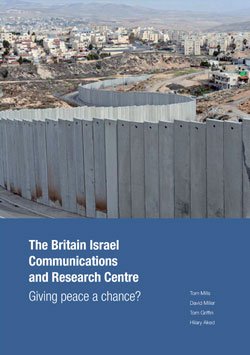Report Review: The Britain Israel Communications and Research Centre: Giving peace a chance?
November 11, 2013
In a recent debate in parliament, it was reported that former British Foreign Secretary Jack Straw had said that the greatest obstacle to peace between Israel, Palestine, and its Arab neighbours are the unlimited funds available to the pro-Israel lobby group AIPAC and other Jewish organisations in the UK.
In response, former Labor Party MK, Einat Wilf, told the newspaper Yedioth Ahronoth: “It was appalling to listen to Britain’s former Foreign Secretary. His remarks reflect prejudice of the worst kind.”
Yet a statement from Jack Straw, sent to the Middle East Monitor (MEMO), clarified his position: “I spoke of the problems which faced President Obama from AIPAC and the “Israeli lobby” more generally. I pointed out that Prime Minister Netanyahu was a player in domestic US politics, on the Republican side, and that under US political funding rules (or their absence) huge sums were spent by AIPAC in support of some elected politicians (or candidates), and against others.”
This attempt to label those who criticise the Israeli state and its supporters as prejudice or anti-Semitic, in an attempt to isolate them, is an approach also used by The Britain Israel Communications and Research Centre (BICOM), a pro-Israel, public relations group. Discrediting those who criticise Israel is all part of the strategy; deflecting rather than addressing the criticisms.
This and BICOM’s other activities are detailed at length in a new report Giving peace a chance, a collaboration between research centre Spinwatch and MEMO, set to be released on 7 December.
According to Giving peace a chance, BICOM is “an opaque organisation that carries out much of its work beyond scrutiny and accountability.” Though BICOM is not necessarily known widely, it is “probably the most important pro-Israel grouping in the UK.”
Much of this is because BICOM targets the political and media elite, rather than the public. Its attention is largely focused on the media, and attempts to shape its articles so that they are more sympathetic towards Israel.
“They tend to mould into the background while their messages get out into the media and into public debate so to some extent it’s an intentional thing,” David Miller, a Professor of Sociology at Bath University and a researcher on the project, told MEMO.
As an organisation, BICOM portrays the idea of being in favour of a two state solution, yet the report argues they in fact refuse to give peace a chance. The reason for this, suggests Miller, is that BICOM do not want to argue against the Israeli government and put their investments at risk, whilst at the same time presenting the image that something positive can happen to protect them from boycotters.
A closer look at BICOM reveals that in fact their positions on essential elements of conflict oppose parts of international law, and as the reports says “are not compatible with the two state solution as envisaged by the international community.”
At the same time as professing support for a Palestinian state, BICOM refers to illegal settlements as communities, neighbourhoods and (like the Israeli government) rejects the “international consensus on settlements.”
On the issue of refugees, BICOM also does not take international law into account, holding that it is not Israel’s responsibility to resettle refugees, but the responsibility of the Arab states on the grounds that if Palestinians did return this would mean the end of Israel as a democratic, Jewish state and the end of the Jewish majority. Instead BICOM suggests that refugees be settled in the new Palestinian state.
A chapter of the report is dedicated to the relationship between former Defence Secretary Liam Fox and BICOM funded Adam Werrity, who acted as “his unofficial advisor.” Whilst Werrity met with Iranian opposition supporters, and was later debriefed by MI6 about them, he also met senior figures from Israel’s Mossad intelligence, who were also intent on stopping Iran’s nuclear programme. Thus, BICOM’s “backers, directors and staff have other interests that shape the conception of the Israeli national interest.”
“They’re walking a tightrope,” says Miller on why he thinks they have adopted and maintained this misleading, double edged approach. “On the one hand they probably want there to be more meaningful, peaceful negotiations, but on the other hand they have to defend the Israeli government to some extent. They’ve got material interests in Israel and more widely than that and they have to defend those. That requires them to walk this line between saying they want peace, but not really being in favour of peace.”
BICOM’s main financial source is their chairman, Poju Zabludowicz, whose cash comes from his father, an arms dealer. Researching who funds them for the report was difficult, explains Miller, largely because there is no central registry or regulation which requires them to reveal this information. “We’ve had to play a kind of cat and mouse game with the archives and the databases to try and trace which foundation in America or which individual or businessman has funded them.”
Yet though it hasn’t been easy, the report does provide some detail on their main funders.
Giving peace a chance calls for the greater transparency of BICOM on the basis that the public have a right to know what kind of organisation it is. With greater transparency it would be easier to see who was funding them, by how much and exactly what activities they were engaged in.
This transparency would then help civil society groups hold them to account; it is difficult for them to maintain a deceptive approach if it is clearer who they are.
“One thing I would say about BICOM is that they really ought to be clearer about what kinds of solutions they support. We argue that they are structurally deceptive in what they say about the peace process in Israel. They pretend to be more in favour of peace than they actually are. What I would say is that if they were more honest about what their interests are that would allow us to have better debates rather than this kind of notion that they’re all trying their best to promote peace.”
Though the report would have been enhanced by comments or a participation in the discussion by members of staff working for BICOM, those approached for an interview either turned the offer down, or failed to reply.
What Miller hopes will come out of Giving peace a chance is that “organisations like BICOM become more effective about their position and more willing to acknowledge the politics they’re defending. Hopefully that means we can have some kind of progress towards peace and justice in the Middle East, rather than just an attempt to muddy the waters and defend rejectionism by the Israeli state.”
Amelia Smith is a staff writer at Middle East Monitor. This review was first published in Arabic by Al-Jazeera.net.




